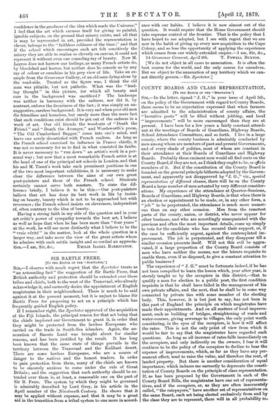SIR BARTLE FRERE.
[TO THE EDITOR OF THE " SPECTATOR:1 observe with much regret that the Spectator treats as "an astounding fact" the suggestion of Sir Bartle Frere, that British authority and protection should be extended over those tribes and chiefs, both to the west of the Transvaal, who already acknowledge it, and earnestly desire the appointment of English magistrates in their neighbourhood. There is much to be said against it at the present moment, but it is unjust to blame Sir Bartle Frere for proposing to act on a principle which has frequently guided English policy.
If I remember right, the Spectator approved of the acquisition of the Fiji Islands, the principal reason for that act being that the chiefs implored our Government to grant it, in order that they might be protected from the lawless Europeans who carried on the trade in South-Sea islanders. Again, the an- nexation of Basuto Land was brought about for similar reasons, and has been justified by the result. It has long been known that the same state of things prevails in the territory between the Transvaal and the Kalihari desert. There are some lawless Europeans, who are a source of danger to the natives and the honest traders. In order to gain protection from them, many of the chiefs are known to be sincerely anxious to come under the rule of Great Britain; and the suggestion that such authority should be ex- tended over them is, at least, a reasonable one on the part of Sir B. Frere. The system by which they might be governed is admirably described by Lord Grey, in his article in the April number of the Nineteenth Century. He shows that it may be applied without expense, and that it may be a great aid in the transition from a tribal system to one more in accord- ance with our habits. I believe it is now almost out of the question. It would require that the Home Government should take supreme control of the frontier. That is the policy that I have hoped to see adopted, but I see with regret that we are now in the habit of giving up every new acquisition to the Cape Colony, and so lose the opportunity of applying the experience which comes from our widely-extended empire.—I am, Sir, Scc., 14 Grosvenor Crescent, Ainil 9th. T. FOWELL BUXTON.
[We do not object in all cases to annexation. It is often the best course for the world, and the only course for ourselves. But we object to the annexation of any territory which we can- not directly govern.—En. Spectator.]


































 Previous page
Previous page